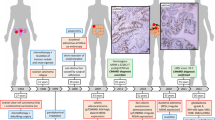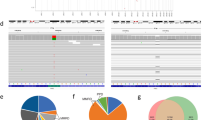Abstract
Constitutional MisMatch Repair Deficiency (CMMRD) is caused by homozygous or compound heterozygous germline variants in one of the mismatch repair (MMR) genes (MSH2, MSH6, PMS2, MLH1). This syndrome results in early onset colorectal cancer, leukemia and lymphoma, brain tumors and other malignancies. Children with CMMRD are at high risk of developing multiple cancers and cancer surveillance does not guarantee detection of cancer at a curable stage. The development of a preventive treatment strategy would be a major step forward. Long-term daily use of acetylsalicylic acid (ASA) has been shown to reduce cancer risk in individuals with Lynch syndrome (LS). LS is caused by heterozygous germline variants of MSH2, MSH6, PMS2 and MLH1 and characterized by an increased risk of developing colorectal and endometrial cancer at adult age. Here we discuss the potential use of ASA for cancer prevention in patients with CMMRD.
Similar content being viewed by others
Log in or create a free account to read this content
Gain free access to this article, as well as selected content from this journal and more on nature.com
or
References
Vasen HF, Ghorbanoghli Z, Bourdeaut F, et al. Guidelines for surveillance of individuals with constitutional mismatch repair-deficiency proposed by the European Consortium “Care for CMMR-D” (C4CMMR-D). J Med Genet. 2014;51:283–93.
Burn J, Gerdes AM, Macrae F, Mecklin JP, Moeslein G, Olschwang S, et al. Long-term effect of aspirin on cancer risk in carriers of hereditary colorectal cancer: an analysis from the CAPP2 randomised controlled trial. Lancet. 2011;378:2081–7.
Bourre-Tessier J, Haraoui B. Methotrexate drug interactions in the treatment of rheumatoid arthritis: a systematic review. J Rheumatol. 2010;37:1416–21.
Ricciardone MD, Ozcelik T, Ceher B, et al. Human MLH1 deficiency predisposes to hematological malignancy and neurofibromatosis type 1. Cancer Res. 1999;59:290–3.
Wang Q, Lasset C, Desseigne F, Frappaz D, et al. Neurofibromatosis and early onset of cancers in hMLH1-deficient children. Cancer Res. 1999;59:294–7.
Shlien A, Campbell BB, de Borja R, et al. Combined hereditary and somatic mutations of replication error repair genes result in rapid onset of ultra-hypermutated cancers. Nat Genet. 2015;47:257–62.
Kohlmann W, Gruber SB. Lynch Syndrome. In: Pagon RA, et al. Eds. GeneReiews(R). Seattle (WA): University of Washington; 1993.
Lynch HT, de la Chapelle A. Hereditary colorectal cancer. N Engl J Med. 2003;348:919–32.
Manders P, Spruijt L, Kets CM, et al. Young age and a positive family history of colorectal cancer are complementary selection criteria for the identification of Lynch syndrome. Eur J Cancer. 2011;47:1407–13.
Durno CA, Aronson M, Tabori U, Malkin D, Gallinger S, Chan HS. Oncologic surveillance for subjects with biallelic mismatch repair gene mutations: 10 year follow-up of a kindred. Pediatr Blood Cancer. 2012;59:652–6.
Durno C, Boland CR, Cohen S, et al. Recommendations on Surveillance and Management of Biallelic Mismatch Repair Deficiency (BMMRD) syndrome: a consensus statement by the US multi-society task force on colorectal cancer. Gastroenterology. 2017;152:1605–14.
Bakry D, Aronson M, Durno C, et al. Genetic and clinical determinants of constitutional mismatch repair deficiency syndrome: report from the constitutional mismatch repair deficiency consortium. Eur J Cancer. 2014;50:987–96.
Bosetti C, Rosato V, Gallus S, Cuzick J, La Vecchia C. Aspirin and cancer risk: a quantitative review to 2011. Ann Oncol. 2012;23:1403–15.
Cuzick J, Otto F, Baron JA, et al. Aspirin and non-steroidal anti-inflammatory drugs for cancer preention: an international consensus statement. Lancet Oncol. 2009;10:501–7.
Cook NR, Lee IM, Gaziano JM, et al. Low-dose aspirin in the primary prevention of cancer: the Women’s Health Study: a randomized controlled trial. JAMA. 2005;294:47–55.
Burn J, Bishop DT, Mecklin JP, Macrae F, et al. Effect of aspirin or resistant starch on colorectal neoplasia in the Lynch syndrome. N Engl J Med. 2008;359:2567–78.
Flossmann E, Rothwell PM. Effect of aspirin on long-term risk of colorectal cancer: consistent evidence from randomised and observational studies. Lancet. 2007;369:1603–13.
Rothwell PM, Wilson M, Elwin CE, et al. Long-term effect of aspirin on colorectal cancer incidence and mortality: 20-year follow-up of five randomised trials. Lancet. 2010;376:1741–50.
Cook NR, Lee IM, Zhang SM, Moorthy MV, Buring JE. Alternate-day, low-dose aspirin and cancer risk: long-term observational follow-up of a randomized trial. Ann Intern Med. 2013;159:77–85.
Rothwell PM, Price JF, Fowkes FG, et al. Short-term effects of daily aspirin on cancer incidence, mortality, and non-vascular death: analysis of the time course of risks and benefits in 51 randomised controlled trials. Lancet. 2012;379:1602–12.
Rothwell PM, Wilson M, Price JF, Belch JF, Meade TW, Mehta Z. Effect of daily aspirin on risk of cancer metastasis: a study of incident cancers during randomised controlled trials. Lancet. 2012;379:1591–601.
Langley RE, Rothwell PM. Aspirin in gastrointestinal oncology: new data on an old friend. Curr Opin Oncol. 2014;26:441–7.
Burn J, Mathers JC, Bishop DT. Chemopreention in Lynch syndrome. Fam Cancer. 2013;12:707–18.
Burn J, Sheth H. The role of aspirin in preventing colorectal cancer. Br Med Bull. 2016;119:17–24.
Chan AT, Ogino S, Fuchs CS. Aspirin and the risk of colorectal cancer in relation to the expression of COX-2. N Engl J Med. 2007;356:2131–42.
Fink SP, Yamauchi M, Nishihara R, et al. Aspirin and the risk of colorectal cancer in relation to the expression of 15-hydroxyprostaglandin dehydrogenase (HPGD). Sci Transl Med. 2014;6:233re2.
Temraz S, Mukherji D, Shamseddine A. Potential targets for colorectal cancer prevention. Int J Mol Sci. 2013;14:17279–303.
Strillacci A, Griffoni C, Sansone P, et al. MiR-101 downregulation is involved in cyclooxygenase-2 overexpression in human colon cancer cells. Exp Cell Res. 2009;315:1439–47.
Roelofs HM, Te Morsche RH, an Heumen BW, Nagengast FM, Peters WH. Over-expression of COX-2 mRNA in colorectal cancer. BMC Gastroenterol. 2014;14:1.
Patrignani P, Patrono C. Aspirin and Cancer. J Am Coll Cardiol. 2016;68:967–76.
Brown JR, DuBois RN. COX-2: a molecular target for colorectal cancer prevention. J Clin Oncol. 2005;23:2840–55.
Cao Y, Nishihara R, Qian ZR, Song M, et al. Regular aspirin use associates with lower risk of colorectal cancers with low numbers of tumor-infiltrating lymphocytes. Gastroenterology. 2016;151:879–92.e4.
Zelenay S, an der Veen AG, Bottcher JP, et al. Cyclooxygenase-dependent tumor growth through evasion of immunity. Cell. 2015;162:1257–70.
Rothwell PM. Aspirin in prevention of sporadic colorectal cancer: current clinical evidence and overall balance of risks and benefits. Recent Results Cancer Res. 2013;191:121–42.
Veettil SK, Lim KG, Ching SM, Saokaew S, Phisalprapa P, Chaiyakunapruk N. Effects of aspirin and non-aspirin nonsteroidal anti-inflammatory drugs on the incidence of recurrent colorectal adenomas: a systematic review with meta-analysis and trial sequential analysis of randomized clinical trials. BMC Cancer. 2017;17:763.
Elzey BD, Tian J, Jensen RJ, et al. Platelet-mediated modulation of adaptive immunity. A communication link between innate and adaptive immune compartments. Immunity. 2003;19:9–19.
Sitia G, Aiolfi R, Di Lucia P, et al. Antiplatelet therapy prevents hepatocellular carcinoma and improes survival in a mouse model of chronic hepatitis B. Proc Natl Acad Sci USA. 2012;109:E2165–72.
Rachidi S, Metelli A, Riesenberg B, et al. Platelets subvert T cell immunity against cancer via GARP-TGFbeta axis. Sci Immunol, 2017;2:1–27.
Ruschoff J, Wallinger S, Dietmaier W, et al. Aspirin suppresses the mutator phenotype associated with hereditary nonpolyposis colorectal cancer by genetic selection. Proc Natl Acad Sci USA. 1998;95:11301–6.
McIlhatton MA, Tyler J, Burkholder S, et al. Nitric oxide-donating aspirin deriaties suppress microsatellite instability in mismatch repair-deficient and hereditary nonpolyposis colorectal cancer cells. Cancer Res. 2007;67:10966–75.
Luciani MG, Campregher C, Gasche C. Aspirin blocks proliferation in colon cells by inducing a G1 arrest and apoptosis through actiation of the checkpoint kinase ATM. Carcinogenesis. 2007;28:2207–17.
Schmugge M, Speer O, Kroiss S, et al. Monitoring aspirin therapy in children after interventional cardiac catheterization: laboratory measures, dose response, and clinical outcomes. Eur J Pediatr, 2015;174:933–41.
Schoenfeld AJ, Grady D. Adverse effects associated with proton pump inhibitors. JAMA Intern Med. 2016;176:172–4.
Lazarus B, Chen Y, Wilson FP, et al. Proton pump inhibitor use and the risk of chronic kidney disease. JAMA Intern Med. 2016;176:238–46.
Howell MD, Noack V, Grgurich P, et al. Iatrogenic gastric acid suppression and the risk of nosocomial Clostridium difficile infection. Arch Intern Med. 2010;170:784–90.
Belay ED, Bresee JS, Holman RC, Khan AS, Shahriari A, Schonberger LB. Reye’s syndrome in the United States from 1981 through 1997. N Engl J Med. 1999;340:1377–82.
Autret-Leca E, Jonille-Bera AP, Llau ME, et al. Incidence of Reye’s syndrome in France: a hospital-based surey. J Clin Epidemiol. 2001;54:857–62.
Hurwitz ES, Barrett MJ, Bregman D, et al. Public Health Serice study of Reye’s syndrome and medications. Report of the main study. JAMA. 1987;257:1905–11.
Barrett MJ, Hurwitz ES, Schonberger LB, Rogers MF. Changing epidemiology of Reye syndrome in the United States. Pediatrics. 1986;77:598–602.
Hurwitz ES, Barrett MJ, Bregman D, et al. Public Health Service study on Reye’s syndrome and medications. Report of the pilot phase. N Engl J Med. 1985;313:849–57.
Smith ET Jr., Dais GJ. Medium-chain acylcoenzyme—A dehydrogenase deficiency. Not just another Reye syndrome. Am J Forensic Med Pathol. 1993;14:313–8.
Gosalakkal JA, Kamoji V. Reye syndrome and reye-like syndrome. Pediatr Neurol. 2008;39:198–200.
Schror K. Aspirin and Reye syndrome: a review of the evidence. Paediatr Drugs. 2007;9:195–204.
Gioannucci E. The prevention of colorectal cancer by aspirin use. Biomed Pharmacother. 1999;53:303–8.
Eleftheriou D, Lein M, Shingadia D, Tulloh R, Klein NJ, Brogan PA. Management of Kawasaki disease. Arch Dis Child. 2014;99:74–83.
Anderson BJ, Holford NH. Mechanism-based concepts of size and maturity in pharmacokinetics. Annu Re Pharmacol Toxicol. 2008;48:303–32.
Cascorbi I. Drug interactions—principles, examples and clinical consequences. Dtsch Arztebl Int. 2012;109:546–55. quiz 556
Nalamachu S, Pergolizzi JV, Raffa RB, Lakkireddy DR, Taylor R Jr. Drug–drug interaction between NSAIDS and low-dose aspirin: a focus on cardioascular and GI toxicity. Expert Opin Drug Saf. 2014;13:903–17.
Author information
Authors and Affiliations
Corresponding author
Ethics declarations
Conflict of interest
Professor Burn has a longstanding relationship with Bayer Pharma who have supported the CaPP Cancer Prevention trials. He has received fees for delivering lectures on this topic.
Rights and permissions
About this article
Cite this article
Leenders, E.K.S.M., Westdorp, H., Brüggemann, R.J. et al. Cancer prevention by aspirin in children with Constitutional Mismatch Repair Deficiency (CMMRD). Eur J Hum Genet 26, 1417–1423 (2018). https://doi.org/10.1038/s41431-018-0197-0
Received:
Revised:
Accepted:
Published:
Issue date:
DOI: https://doi.org/10.1038/s41431-018-0197-0
This article is cited by
-
ERN GENTURIS guidelines on constitutional mismatch repair deficiency diagnosis, genetic counselling, surveillance, quality of life, and clinical management
European Journal of Human Genetics (2024)
-
Diagnostic challenges in a CMMRD patient with a novel mutation in the PMS2 gene: a case report
BMC Medical Genomics (2021)



